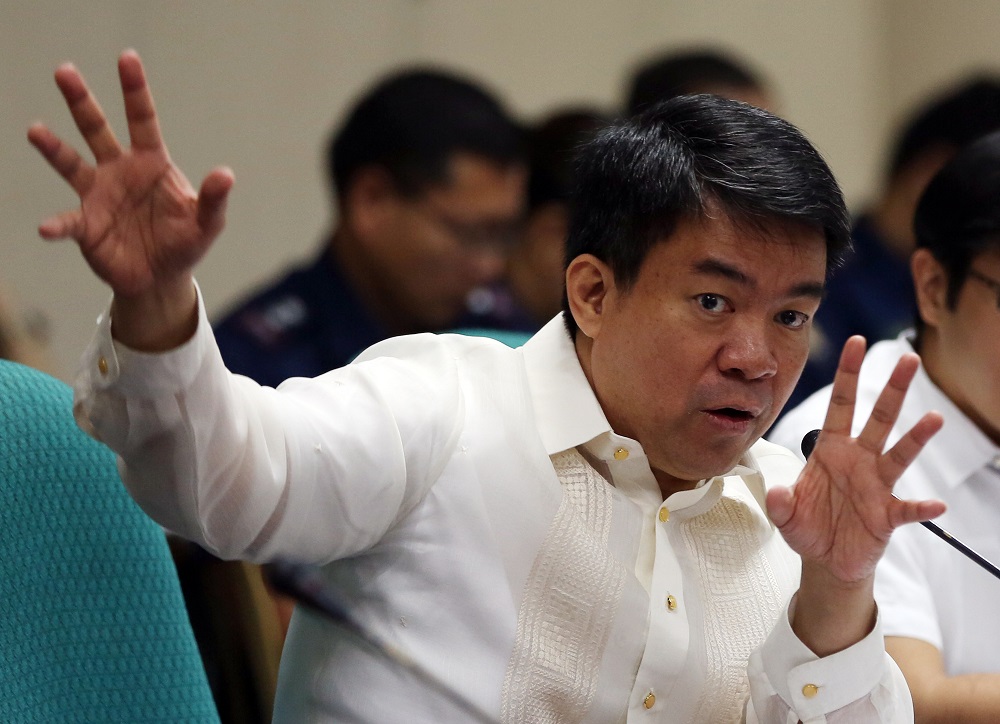THE COMMISSION on Elections (Comelec) should prove that it is impossible to follow the Supreme Court order for it to issue voter receipts on Election Day, otherwise it can be accused of engaging in “fear-mongering” because it announced that it may resort to manual counting.
Sen. Aquilino “Koko” Pimentel III issued the challenge to the Comelec Sunday, pointing out that by his own calculations, the poll body can very well comply with the high court order.
“The Comelec should show not only the Supreme Court but also the entire nation why it’s impossible, not merely difficult, for it to comply with the giving of paper receipts to voters,” Pimentel said in a text message.
“Without any such well-studied time and motion study, the Comelec is merely engaging in fear-mongering and should stop such a practice,” said Pimentel, who chairs the Senate committee on electoral reforms and people’s participation.
In a unanimous decision on March 8, the high court ordered the Comelec to issue voter receipts as a verification mechanism for the electorate in the May 9 elections, granting the mandamus petition that senatorial candidate Richard Gordon filed on Feb. 22.
Gordon, principal author of the automated election law, said in his petition that a “physical record” like a voting receipt was necessary to ensure a transparent and credible election.
Manual voting
The Comelec is now preparing for manual voting, among other measures, in case the high court rejects its motion for reconsideration to its ruling.
Besides going manual, the Comelec is entertaining the possibility of postponing altogether the elections.
Last week, Comelec Chair Andres Bautista said the poll body was considering a postponement of the May 9 elections after the Supreme Court order, which would “materially affect” the election timeline.
Three-month delay
The poll body said the high court’s order could set back some three months its preparations for the May balloting.
VOTE-COUNTING machines underwent a field test by the Comelec and Smartmatic in Marikina City in January. RAFFY LERMA
Whether voter receipts could be issued by the poll body was taken up last month by a joint congressional oversight committee hearing on the poll preparations.
At that time, Bautista said the poll body had decided not to print receipts for voters, which is provided for in the vote-counting machines, because of time constraints.
Additional 5 hours
The Comelec chief said at the hearing that the Comelec en banc had voted 7-0 against the printing of receipts for voters because of the time it would take to do so.
It would take 13 seconds to print a receipt, 15 seconds to read a printout and then minutes more to change the paper roll in the vote-counting machine.
Bautista said the process would add five to seven hours to the voting time on May 9.
But Sunday Pimentel said the Comelec should defend its position.
“I’ve made my own calculations. Assume printing receipts for 15 seconds per voter. That would amount to only 3.33 hours even if 800 voters vote [in every precinct],” said the senator, who presided over the joint hearing last month.
Asked whether the issuance of voter receipt was doable, Pimentel said: “Yes. Unless Comelec convincingly shows otherwise.”
UNA stand
Also cautioning the poll body against holding manual polls on May 9 was Navotas Rep. Toby Tiangco, president of the United Nationalist Alliance (UNA) party of Vice President Jejomar Binay.
Tiangco urged the Comelec to file a motion for reconsideration in the Supreme Court and “explain its position.”
“Manual polls should not be an option because that is against the law,” he said.
The country has adopted automated elections since 2010.
Public confidence
Postponing the May elections for any reason will erode the public’s confidence in the electoral process, said Rep. Leni Robredo, the Liberal Party (LP) vice presidential candidate.
The Camarines Sur representative said she was not in favor of moving the general elections as a result of difficulties brought about by the Supreme Court decision compelling the Comelec to print voter receipts.
“If we postpone the elections, the people’s confidence in the electoral process will be eroded,” Robredo said in a chance interview.
The law states that national elections be held every second Monday of May, although a postponement may be permitted under certain conditions.
A delay in the Comelec timeline, however, is not among those conditions.
Under the Omnibus Election Code, the Comelec may postpone an election “for any serious cause such as violence, terrorism, loss or destruction of election paraphernalia or records, force majeure (superior force or accident) and other analogous causes.”
The widow of Interior Secretary Jesse Robredo said a postponement would only breed suspicions of an attempt to rig the vote, among other motivations.
“For me, the government must do all it can to push through with the elections. Cooperation is needed so we can meet the deadline. It is not in the country’s interest to postpone the elections,” she said.
